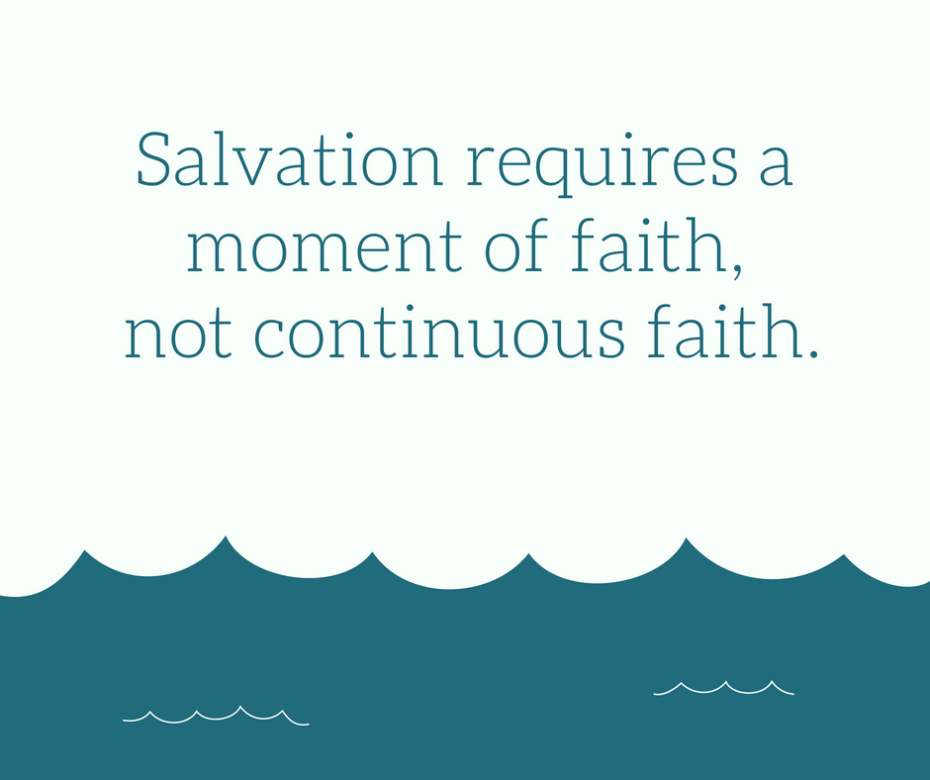Jack Cottrell is an Arminian writer and theologian. He writes from within the Stone-Campbell tradition. If you’d like to read an Arminian who believes in inerrancy and tries to be a Biblical theologian, I recommend his work (though, not all his conclusions!).
His Truth: Scriptural Truths About Basic Doctrines is Cottrell’s short (116 pages) summary of Christian doctrine. Due to its brief nature, Cottrell does not try to defend his conclusion exegetically. For that, you will have to read his other books. But I think it is a handy summary of Arminian doctrine.
The last chapter is on assurance. I plan to write a few blogs about it, explaining how Free Grace Theology would respond to Cottrell’s version of Arminianism. In this blog, I want to clarify a point of confusion that I see in Cottrell’s description of the doctrine of eternal security.
First, let me say that Cottrell rightly recognizes that,
“From a practical standpoint, this is the question…We need ‘blessed assurance,’ the assurance of salvation” (p. 109).
He’s right. Assurance is the question.
Cottrell begins the chapter by identifying “the two most popular erroneous concepts of assurance” (p. 110). He says the first erroneous concept is “once saved, always saved.”
Not a good start.
Here is how he describes the doctrine:
“The idea is that once one becomes a true believer, it is impossible for him to lose his faith (permanently, at least) and therefore impossible for him to lose his salvation…He need not worry about ever falling away from grace. God will preserve him in faith forever” (p. 110).
Did you notice his mistake? What is the condition of eternal security, according to Cottrell?
Continuous faith.
Actually, not just continuous faith. He says that, according to “once saved always saved,” that you are only secure so long as God keeps you believing forever.
Attentive readers will recognize that what Cottrell is describing is the Calvinistic doctrine of perseverance, not the Biblical doctrine of eternal security. He makes that association explicit:
“This view is an integral part of the total system of Calvinism. The ‘P’ in the T-U-L-I-P acrostic stands for ‘perseverance (preservation) of the saints’” (p. 110).
Here is my basic point: the Free Grace doctrine of eternal security is not the Calvinistic doctrine of the perseverance of the predestined.
Calvinism makes eternal security depend upon a whole scheme of election and predestination that denies human free will (p. 110) and requires a lifetime of continuous faith to be saved. Many of us in Free Grace Theology deny the Calvinistic approach to election. Instead, we believe the Bible teaches election is primarily to service and reward, not to eternal life (see here, here, here, and here).
By contrast, as we understand it, the Biblical doctrine of eternal security does not depend on a particular theory of election or predestination. Instead, it depends on a single, free act of faith in Jesus’ promise of eternal life.
This is what Jesus said:
“For God so loved the world that He gave His only begotten Son, that whoever believes in Him should not perish but have everlasting life” (John 3:16).
“Most assuredly, I say to you, he who hears My word and believes in Him who sent Me has everlasting life, and shall not come into judgment, but has passed from death into life” (John 5:24).
“Most assuredly, I say to you, he who believes in Me has everlasting life” (John 6:47).
What is Jesus promising?
If you believe in Him, you have everlasting life.
That’s it.
That’s the fundamental basis of the Biblical doctrine of eternal security. That’s what Free Grace Theology holds.
This eternal security is promise based, not election-and-predestination based.
Do you see the difference between that doctrine, and the Calvinist doctrine of perseverance?
Jesus required a single act of faith to have everlasting life, not a lifetime of continuous faith (see here and here). The split second you are persuaded that Jesus gives believers eternal life, you have that life. It is a present possession, not a future, and uncertain, goal that comes at the end of a lifetime of believing.
And since it is everlasting life, you cannot lose it. If you could, it would not be everlasting, but temporary. The very nature of the life Jesus gives believers implies eternal security.
And if that’s not explicit enough, Jesus said, once you believe, you “shall not perish” (John 3:16), “will never thirst” (John 4:14), “shall not come under judgment” (John 5:24), “shall never hunger” (John 6:35), and “will never die” (John 11:26). If you could lose your salvation, you would perish, thirst, hunger, and die. But Jesus said that is impossible.
But what about believers who stop believing? Do they stop being eternally secure?
No.
On the Free Grace view, a person can lose their faith and persist in unbelief until the end of their life, and still be eternally secure (see here).
That doesn’t mean there won’t be consequences for the apostate. They will lose their joy and assurance of salvation. They will come under divine discipline and temporal judgment. And they will lose their eternal rewards. But they will not lose their eternal salvation.


